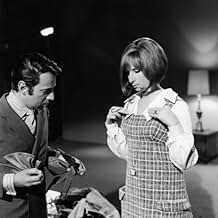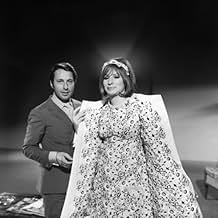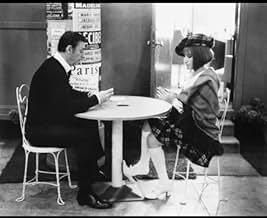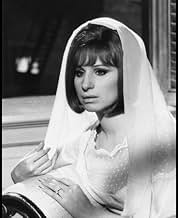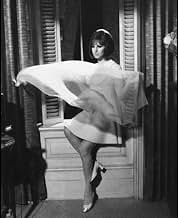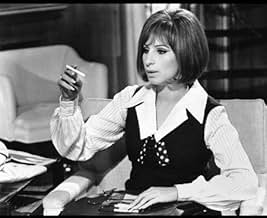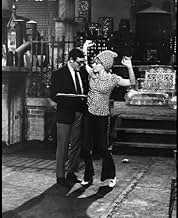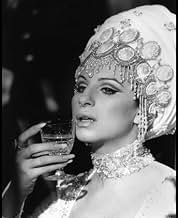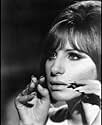IMDb RATING
6.4/10
4.5K
YOUR RATING
A troubled young woman who visits a psychotherapist to help her quit smoking undergoes hypnosis and finds herself reliving a tragic Victorian romance from a past life.A troubled young woman who visits a psychotherapist to help her quit smoking undergoes hypnosis and finds herself reliving a tragic Victorian romance from a past life.A troubled young woman who visits a psychotherapist to help her quit smoking undergoes hypnosis and finds herself reliving a tragic Victorian romance from a past life.
Featured reviews
This is one of those films that one would like to praise without reservation, but, alas!, some elements are not quite up to the high level of some of its attributes.
Streisand, after that stunning title montage (Love those blooming flowers and the clever lyrics that coax them into the sunshine!) is a bit grating in her opening scenes as Daisy Gamble, though she mellows somewhat as the modern-day plot progresses. However she more than rises to the occasion when Melinda is exhumed and she gets to parade about in Cecil Beaton's absolutely stunning accoutrements. Montand, who seems to have learned his lines phonetically (A foreign accent can be charming but he seems to be exaggerating his!), is serviceable, sings on key, and manfully wades through the machinations of the scriptwriters, what with the absurd brouhaha over reincarnation among the university's powers-that-be and Dr. Chabot's stubborn reluctance to admit that Daisy has psychic powers, et cetera. John de Cuir does his usual eye-filling wonders with the production design, beautifully aided by Harry Stradling, Sr.'s use of the Panavision/Technicolor cameras. And, of course, Burton Lane's score has a few liltingly listenable songs that propel the story quite felicitously. And there's the bonus of two of my favorite actresses, Mabel Albertson and Irene Handl, to add some sly support. (And, one must reluctantly mention Jack Nicholson, youthfully handsome in his brief appearance here, now a gothic ruin of his former self...Must be all those ill-tempered characters he's since played, as well as the reported off-screen dissipation in the decades since.)
But Nelson Riddle, undeniably one of the all-time great arrangers for singers like Frank Sinatra and Ella Fitzgerald, seems the wrong choice to orchestrate and conduct the musical elements. His work seems a little thin and not equal to the lush visual panoply. And, I suspect, Vincente Minnelli was hampered by the producer, Howard Koch, whose credits suggest a level of taste and achievement more oriented to audiences that preferred something less refined than what might have best suited this enterprise. The direction seems a bit diffuse, and even dispirited, and certainly not up to the standard of Minnelli's best in his halcyon days at Metro-Goldwyn-Mayer.
Nevertheless, I'll admit I enjoyed it when I saw it during its theatrical release, but beware of non-letterboxed video transfers. "Formatting" will reduce this one to considerably less than its makers intentions. If a DVD release comes along and you're a Streisand (or Minnelli) fan, it'll be worth the wait.
Streisand, after that stunning title montage (Love those blooming flowers and the clever lyrics that coax them into the sunshine!) is a bit grating in her opening scenes as Daisy Gamble, though she mellows somewhat as the modern-day plot progresses. However she more than rises to the occasion when Melinda is exhumed and she gets to parade about in Cecil Beaton's absolutely stunning accoutrements. Montand, who seems to have learned his lines phonetically (A foreign accent can be charming but he seems to be exaggerating his!), is serviceable, sings on key, and manfully wades through the machinations of the scriptwriters, what with the absurd brouhaha over reincarnation among the university's powers-that-be and Dr. Chabot's stubborn reluctance to admit that Daisy has psychic powers, et cetera. John de Cuir does his usual eye-filling wonders with the production design, beautifully aided by Harry Stradling, Sr.'s use of the Panavision/Technicolor cameras. And, of course, Burton Lane's score has a few liltingly listenable songs that propel the story quite felicitously. And there's the bonus of two of my favorite actresses, Mabel Albertson and Irene Handl, to add some sly support. (And, one must reluctantly mention Jack Nicholson, youthfully handsome in his brief appearance here, now a gothic ruin of his former self...Must be all those ill-tempered characters he's since played, as well as the reported off-screen dissipation in the decades since.)
But Nelson Riddle, undeniably one of the all-time great arrangers for singers like Frank Sinatra and Ella Fitzgerald, seems the wrong choice to orchestrate and conduct the musical elements. His work seems a little thin and not equal to the lush visual panoply. And, I suspect, Vincente Minnelli was hampered by the producer, Howard Koch, whose credits suggest a level of taste and achievement more oriented to audiences that preferred something less refined than what might have best suited this enterprise. The direction seems a bit diffuse, and even dispirited, and certainly not up to the standard of Minnelli's best in his halcyon days at Metro-Goldwyn-Mayer.
Nevertheless, I'll admit I enjoyed it when I saw it during its theatrical release, but beware of non-letterboxed video transfers. "Formatting" will reduce this one to considerably less than its makers intentions. If a DVD release comes along and you're a Streisand (or Minnelli) fan, it'll be worth the wait.
Based on the marginally successful 1965 Broadway musical with book and lyrics by Alan Jay Learner and a solid score by Burton Lane, the 1970 ON A CLEAR DAY YOU CAN SEE FOREVER was no box office disaster--but it was a disappointment, failing to draw a broad audience and performing much more poorly than any one had imagined. This is a pity, for although it cannot be classed among the truly great musical musicals it is nonetheless a very good one, imaginatively filmed and beautifully performed.
The story concerns a scatter-brained young woman named Daisy Gamble (Barbra Streisand) who is desperate to quit smoking and who lays siege to a noted hypnotist Dr. Charbot (Yves Montand.) But it happens that Daisy, for all her goofiness, is unexpectedly gifted: she can find lost items, she knows when the telephone will ring--and once under hypnosis she stuns Charbot by transforming into Melinda, a woman who lived, loved, and died more than a century before.
The cast is superior. Streisand is memorably fresh in the role of Daisy and performs her numbers with remarkable youthful zeal and a flawless artistry; she is a tremendous amount of fun to watch and an endless pleasure to hear. Although it seems many Americans fail to see the appeal of the great French singer and actor Yves Montand, he handles his songs with the same world-weary style that first brought him to the attention of the legendary Edith Piaf--and it proves a remarkably effective foil for Streisand, setting off her expansive performance to perfection. The remaining cast, which includes a very young Jack Nicholson and Bob Newhart, is equally fine.
This was the last musical for Vincent Minnelli, perhaps the greatest director of golden age musicals and creator of such films as MEET ME IN ST. LOUIS, and he endows the film with his very elegant eye; the "past life" sequences, in which designer Cecil Beaton had a hand, are particularly beautiful. Add in such beautifully orchestrated and performed songs as "It's Lovely Up Here," "Come Back To Me," and the title piece--and when all is said and done ON A CLEAR DAY is a very enjoyable film indeed.
The film was originally intended to be released in a three hour version--but in the wake of several box office disasters for large scale musicals both Minnelli and the studio thought better of it and cut the film significantly. It would seem these scenes are gone forever, and more's the pity. Still, this no-frills DVD release offers a best-possible print in terms of both sound and picture, and both long-time fans and newcomers will adore it. Recommended.
Gary F. Taylor, aka GFT, Amazon Reviewer
The story concerns a scatter-brained young woman named Daisy Gamble (Barbra Streisand) who is desperate to quit smoking and who lays siege to a noted hypnotist Dr. Charbot (Yves Montand.) But it happens that Daisy, for all her goofiness, is unexpectedly gifted: she can find lost items, she knows when the telephone will ring--and once under hypnosis she stuns Charbot by transforming into Melinda, a woman who lived, loved, and died more than a century before.
The cast is superior. Streisand is memorably fresh in the role of Daisy and performs her numbers with remarkable youthful zeal and a flawless artistry; she is a tremendous amount of fun to watch and an endless pleasure to hear. Although it seems many Americans fail to see the appeal of the great French singer and actor Yves Montand, he handles his songs with the same world-weary style that first brought him to the attention of the legendary Edith Piaf--and it proves a remarkably effective foil for Streisand, setting off her expansive performance to perfection. The remaining cast, which includes a very young Jack Nicholson and Bob Newhart, is equally fine.
This was the last musical for Vincent Minnelli, perhaps the greatest director of golden age musicals and creator of such films as MEET ME IN ST. LOUIS, and he endows the film with his very elegant eye; the "past life" sequences, in which designer Cecil Beaton had a hand, are particularly beautiful. Add in such beautifully orchestrated and performed songs as "It's Lovely Up Here," "Come Back To Me," and the title piece--and when all is said and done ON A CLEAR DAY is a very enjoyable film indeed.
The film was originally intended to be released in a three hour version--but in the wake of several box office disasters for large scale musicals both Minnelli and the studio thought better of it and cut the film significantly. It would seem these scenes are gone forever, and more's the pity. Still, this no-frills DVD release offers a best-possible print in terms of both sound and picture, and both long-time fans and newcomers will adore it. Recommended.
Gary F. Taylor, aka GFT, Amazon Reviewer
ON A CLEAR DAY opens with two extraordinary sequences. Firstly, with Babs singing the title song, there is a montage of flowers growing at speed in front of our very eyes, a decisively Minnellian melange of colour and artifice to create a real eye-dazzlingly emotional explosion which reaches an ecstatic crescendo as Babs skips through a maze of floral abundance. This is followed by a chilling, antithetical credits sequence, a VERTIGOesque assembly-line of diminishing rectangles in cool, gorgeous colours, in which the familiar Broadway music feels distorted and distant.
These two sequences encapsulate the film's conflict - between heart and mind; emotion and intellect; freedom and order; dream and reality; self-expression and conformity. In 1970, the age of BONNIE AND CLYDE, M*A*S*H and WOODSTOCK, a Minnelli/Lerner/Streisand musical must have seemed amusingly quaint, but today, we can marvel at its audacity and flair, while many of its more acclaimed contemporaries seem tinny and shrill.
The narrative proper seems initially mundane after such abstract excess. Daisy Gamble (perfect name!) interrupts a lecture by famed psychologist, Marc Chabot, being accidentally hypnotised as he demonstrates on a pupil. She is a scatty, ditzy loudmouth who has come to Chabot in the hope that he will manipulate her out of a 5-packs a day smoking habit to please her ultra-conformist fiance, Warren, who has a career-crucial business dinner.
Chabot has little interest in this clumsy pest until he discovers that she has some psychic powers. Intrigued, he explores her through hypnosis and discovers her past-life as a supremely resourceful, sexually magnetic, orphaned Cockey golddigger of the Regency, who is standing trial for espionage and treason, her caddish husband having deserted her. Chabot begins to fall in love with this remarkable woman, and believing, against all his rationalist principles, in reincarnation.
Even by Minnelli's standards, this is a bravely open-ended picture, not only in its unexpected denouenment, but in refusing to simplify the bewildering, complicated emotions his characters become prey to. On a simple structural level, he contrasts conformity with the life of emotion and imagination. Chabot is a doctor whose devotion to science and facts is almost monkish in its celibate form. His office is the embodiment of conformity, a bland brown pervading walls, chairs, fittings, barred windows, books, even his own clothes. Despite being Yves Montand, he is no French lover.
Into his life comes this impossible woman whose striving for fiance-pleasing order results in further chaos. In her second incarnation, as Melinda, she brings bawdiness, vulgarity, romance, humour, daring, but, most of all, colour, sumptuous, ravishing, blinding colour. The effect she has on Chabot is reflected in the film's form, which moves from steady, mid-level, classical compositions, to outrageous fancy, dizzying camera movements, mercurial editing cutting across time and space. Chabot soon begins to have Daisy's dreams, while she becomes divided from herself in a remarkable visualisation of the split between duty and desire.
But it's not enough to suggest simplistic dichotomies - even the 'normal' Daisy has a rooftop garden which is simply magical (isn't that such a lovely idea, a woman who makes flowers grow quickly by talking to them?), while her fiance, like Darrin from BEWITCHED, is so desperate to conform that he becomes mad. 'Sciences', such as psychoanalysis are invoked in the spirit of the times, but the Pandora's Box they open in no way 'explain', but sets free, as Chabot ruefully recognises.
This is all significantly gendered as men try to control and explain a woman who darts gleefully through history, place, morality, while barely taking a break. As ever with Minnelli, the celebration of artifice only reveals how repressive real-life is, and his satire is cutting if you care to look. This is an undervalued, joyous, sad coda to one of Hollywood's greatest careers (Minnelli would go on to make only one more movie), as full of invention and love as his first film, CABIN IN THE SKY.
The music is fine, with little of the heartache as GIGI or fun of MY FAIR LADY. Montand is charming in a thankless role, but Barbara Streisand - and, God help me, I never thought I'd say this - is an absolute joy in a double (treble?) role, especially convincing in saucy period dress, yet, moving when she needs to be.
These two sequences encapsulate the film's conflict - between heart and mind; emotion and intellect; freedom and order; dream and reality; self-expression and conformity. In 1970, the age of BONNIE AND CLYDE, M*A*S*H and WOODSTOCK, a Minnelli/Lerner/Streisand musical must have seemed amusingly quaint, but today, we can marvel at its audacity and flair, while many of its more acclaimed contemporaries seem tinny and shrill.
The narrative proper seems initially mundane after such abstract excess. Daisy Gamble (perfect name!) interrupts a lecture by famed psychologist, Marc Chabot, being accidentally hypnotised as he demonstrates on a pupil. She is a scatty, ditzy loudmouth who has come to Chabot in the hope that he will manipulate her out of a 5-packs a day smoking habit to please her ultra-conformist fiance, Warren, who has a career-crucial business dinner.
Chabot has little interest in this clumsy pest until he discovers that she has some psychic powers. Intrigued, he explores her through hypnosis and discovers her past-life as a supremely resourceful, sexually magnetic, orphaned Cockey golddigger of the Regency, who is standing trial for espionage and treason, her caddish husband having deserted her. Chabot begins to fall in love with this remarkable woman, and believing, against all his rationalist principles, in reincarnation.
Even by Minnelli's standards, this is a bravely open-ended picture, not only in its unexpected denouenment, but in refusing to simplify the bewildering, complicated emotions his characters become prey to. On a simple structural level, he contrasts conformity with the life of emotion and imagination. Chabot is a doctor whose devotion to science and facts is almost monkish in its celibate form. His office is the embodiment of conformity, a bland brown pervading walls, chairs, fittings, barred windows, books, even his own clothes. Despite being Yves Montand, he is no French lover.
Into his life comes this impossible woman whose striving for fiance-pleasing order results in further chaos. In her second incarnation, as Melinda, she brings bawdiness, vulgarity, romance, humour, daring, but, most of all, colour, sumptuous, ravishing, blinding colour. The effect she has on Chabot is reflected in the film's form, which moves from steady, mid-level, classical compositions, to outrageous fancy, dizzying camera movements, mercurial editing cutting across time and space. Chabot soon begins to have Daisy's dreams, while she becomes divided from herself in a remarkable visualisation of the split between duty and desire.
But it's not enough to suggest simplistic dichotomies - even the 'normal' Daisy has a rooftop garden which is simply magical (isn't that such a lovely idea, a woman who makes flowers grow quickly by talking to them?), while her fiance, like Darrin from BEWITCHED, is so desperate to conform that he becomes mad. 'Sciences', such as psychoanalysis are invoked in the spirit of the times, but the Pandora's Box they open in no way 'explain', but sets free, as Chabot ruefully recognises.
This is all significantly gendered as men try to control and explain a woman who darts gleefully through history, place, morality, while barely taking a break. As ever with Minnelli, the celebration of artifice only reveals how repressive real-life is, and his satire is cutting if you care to look. This is an undervalued, joyous, sad coda to one of Hollywood's greatest careers (Minnelli would go on to make only one more movie), as full of invention and love as his first film, CABIN IN THE SKY.
The music is fine, with little of the heartache as GIGI or fun of MY FAIR LADY. Montand is charming in a thankless role, but Barbara Streisand - and, God help me, I never thought I'd say this - is an absolute joy in a double (treble?) role, especially convincing in saucy period dress, yet, moving when she needs to be.
This is one of those musicals that rarely gets talked about. Even the original stage version is not as well known as say, "Oklahoma!" or "West Side Story", but it should be. It has some wonderful music and an intriguing story.
However, comparing the stage version of this show with the film would be pointless, because all filmed musicals of Broadway shows usually change in more then a few ways. As for this film, it is a charming watch, and an enjoyable way to spend a couple of hours. You don't need to be fans of either of the lead actors, but it does help if you are a musical fan and are somewhat interested in the science of ESP.
The songs in this film are all great, not one of them are what I would consider "filler". A few of the original songs from the stage show have been replaced here with different pieces, but they are good ones nontheless. My only complaint in them is Yves Montand's singing. It's difficult enough to understand his spoken word, but it's even worst when he sings. John Cullum's singing in the original Broadway version is so clear and strong, and Montand is just not at par with that. Still, the quality of the songs themselves, make up for this. The Technicolor is stupendous, lusch and vivid. It's a shame that the film was cut so badly before it was released. Not having seen that version, it's difficult for me to say whether or not it would have been an improvement over the finished product, but I doubt it. As it is, this is a decent, pleasant musical film, and worth watching if you are a fan of the genre.
However, comparing the stage version of this show with the film would be pointless, because all filmed musicals of Broadway shows usually change in more then a few ways. As for this film, it is a charming watch, and an enjoyable way to spend a couple of hours. You don't need to be fans of either of the lead actors, but it does help if you are a musical fan and are somewhat interested in the science of ESP.
The songs in this film are all great, not one of them are what I would consider "filler". A few of the original songs from the stage show have been replaced here with different pieces, but they are good ones nontheless. My only complaint in them is Yves Montand's singing. It's difficult enough to understand his spoken word, but it's even worst when he sings. John Cullum's singing in the original Broadway version is so clear and strong, and Montand is just not at par with that. Still, the quality of the songs themselves, make up for this. The Technicolor is stupendous, lusch and vivid. It's a shame that the film was cut so badly before it was released. Not having seen that version, it's difficult for me to say whether or not it would have been an improvement over the finished product, but I doubt it. As it is, this is a decent, pleasant musical film, and worth watching if you are a fan of the genre.
Okay, granted you have to like Barbra Streisand to love this movie. But for those of you who don't, it's worth a catch just to see Bob Newhart and Jack Nicholson as "young" men. Jack is especially funny in his short scenes with Barbra and her fiancée...
But the main reason to see this flick is the acting and musical talent of Barbra. She has to STRETCH to play a mousy crowd follower, and then switch it up to play a haughty wealthy socialite in a past time period. The costumes are out of this world, and the film should have won an academy award for costume design, although Barbra's figure did her costumes justice. The periods in history represented by the film are stunningly presented. All in all, this is my favorite movie of all time. There is laughter, sorrow, drama, singing, dancing, lots of Barbra skin showing, sexuality, scorn, mocking, a panorama of events and celebrations and Barbra's eventual awakening as her own person. I salute Vicente Minnelli, post mortem.
But the main reason to see this flick is the acting and musical talent of Barbra. She has to STRETCH to play a mousy crowd follower, and then switch it up to play a haughty wealthy socialite in a past time period. The costumes are out of this world, and the film should have won an academy award for costume design, although Barbra's figure did her costumes justice. The periods in history represented by the film are stunningly presented. All in all, this is my favorite movie of all time. There is laughter, sorrow, drama, singing, dancing, lots of Barbra skin showing, sexuality, scorn, mocking, a panorama of events and celebrations and Barbra's eventual awakening as her own person. I salute Vicente Minnelli, post mortem.
Did you know
- TriviaAccording to the 1974 biography "Barbra Streisand: The First Decade", this was originally envisioned as a three-hour "road show" extravaganza, and included many sequences of Daisy's other lives (photos of which were printed in some pre-release promotions), but director Vincente Minnelli and the studio felt it would be too long, especially since musicals had already begun to fail at the box office. In addition to all but the briefest of Jack Nicholson's scenes being cut, a musical number sung by him and Streisand, "Who Is There Among Us Who Knows?," was also cut, as well as "Wait Till We're Sixty-Five," a duet between Larry Blyden and Barbra Streisand. Producer Howard W. Koch conducted a search for the deleted footage in 1994, particularly Nicholson's song, which he wanted to showcase during the AFI tribute to the actor. Nothing turned up at Paramount. Koch asked Streisand and Minnelli's widow if they had remnants of the cut footage, but neither did. Koch determined that if the film still exists, it's probably in a mislabelled canister.
- GoofsThe telephone ring in Chabot's office is not a typical Bell company ring, even though the story is supposedly set in New York.
- Quotes
Dr. Marc Chabot: I used to be in love with answers, but since I've known you I'm just as astounded by questions. Answers make you wise, questions make you human.
- ConnectionsFeatured in Paramount Presents (1974)
- How long is On a Clear Day You Can See Forever?Powered by Alexa
Details
- Release date
- Country of origin
- Language
- Also known as
- On a Clear Day You Can See Forever
- Filming locations
- Production company
- See more company credits at IMDbPro
Box office
- Budget
- $10,000,000 (estimated)
- Gross US & Canada
- $14,000,000
- Gross worldwide
- $14,000,000
Contribute to this page
Suggest an edit or add missing content

